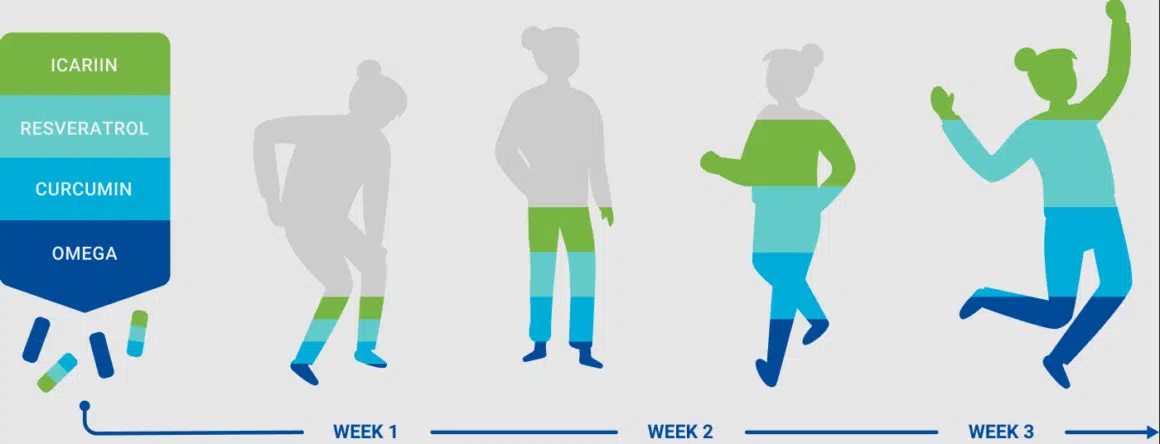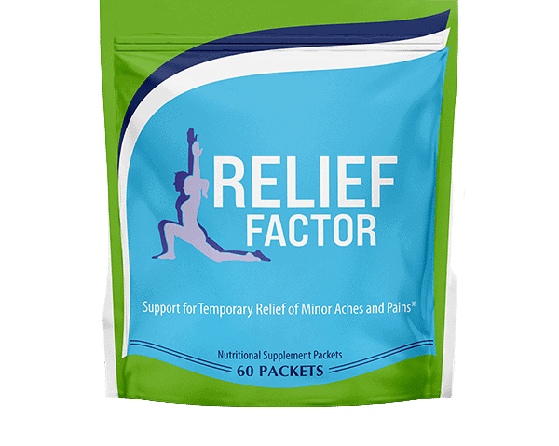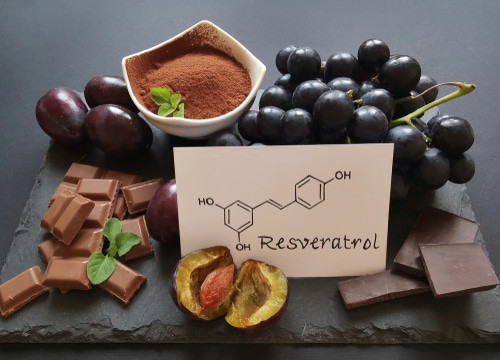Relief Factor is a dietary supplement that only uses four natural ingredients. These four ingredients are used to treat joint pains and inflammation caused by various conditions.
We found the information provided on Relief Factor’s website to be lacking so we went ahead and did our own research regarding the ingredients of the supplement.
For a comprehensive list of exactly what each ingredient does and where they come from, the following article has been created to educate anyone looking for an informed opinion before risking their health and hard-earned cash.
What are the ingredients in Relief Factor?

Icariin

Icariin is a component of the epimedium plant, also known as horny goat weed. It typically helps people with arthritis while also behaving as an anti-inflammatory.
Benefits of Icariin
Icariin is believed to help with osteoporosis and there’s some research to support this. For instance, taking an extract of the epimedium plant for about two years with calcium supplements decreases bone density loss.
This ingredient has additional benefits that reduce cartilage degradation in people who have osteoarthritis. Unfortunately, icariin is not going to undo the damage that has already been done, but it is going to slow it down and give people the mobility they need.
According to Relief Factor’s website, icariin is meant to maintain the best circumstances for the production of nitric oxide that supports blood flow and encourages tissue health.
The website also claims that icariin supports a natural response to daily wear and tear because it affects key enzymes. Although, the how and why, or even which enzymes they’re referring to is unclear.
Additional information and possible drawbacks
Taking horny goat weed extract is generally safe to consume when done properly.
An extract of horny goat weed which contains phytoestrogens has been taken safely for two years at the most. While an extract that contains icariin has been used safely for up to six months.
The problem is that there are certain kinds of horny goat weed that you should not consume because they can cause unwanted side effects. After long periods and high doses, these side effects include dizziness, dry mouth, nosebleeds, thirst, and vomiting.
In a few severe cases, taking large amounts of horny goat weed caused spasms and breathing problems.
Some individuals should avoid consuming horny goat weed altogether. People who are pregnant, breastfeeding, have irregular heartbeats, or women with hormone conditions like endometriosis, uterine fibrosis, or have cancer should not consume horny goat weed.

Resveratrol

Resveratrol is a naturally occurring compound that can be found in peanuts, Japanese knotweed, blueberries, and in the skin of red grapes. Resveratrol contains antioxidants.
Resveratrol is widely available as a dietary supplement made from the extracts of Japanese knotweed, red wine, and grape seeds.
There are many proponents of Resveratrol usage, none more so than David Sinclair. The Australian is a Professor of Genetics at Harvard Medical School has said of the compound…
“(It’s) as close to a miraculous molecule as you can findâ¦. One hundred years from now, people will maybe be taking these molecules on a daily basis to prevent heart disease, stroke, and cancer.” (source).
Take a look at the full list of David Sinclair supplements that are present in his daily stack.
Out of all the extracts that are available to us, Japanese knotweed contains the highest concentration of resveratrol and so is used in many supplements.
Benefits of Resveratrol
As resveratrol is an antioxidant, it helps in protecting cells in our bodies from deteriorating. Cell damage can be caused by free radicals which can lead to cancer, aging diseases, and brain damage.
Free radicals are unstable oxygen atoms that are created by pollution, sunlight, and our body’s natural metabolic processes.
Additionally, resveratrol has other benefits that include protecting the heart and the circulatory system, lowering cholesterol levels, and protecting against blood clots that can lead to a heart attack or a stroke.
It can even help to bring down your blood sugar levels.
In studies conducted on animals, results showed that resveratrol had some impact in reducing brain plaque levels in Alzheimer’s disease.
Unfortunately, the proper studies concerning the human side of things haven’t shown any results like this.
Further animal studies concluded that resveratrol helped with things like weight loss, reducing insulin resistance, and minimizing mortality in diabetes. There are also anti-cancer effects.
There is a study that tested the effects of resveratrol on humans. The results were pretty interesting.
In the study, participants were given 150mg of resveratrol a day for thirty days. The results showed that doing this significantly lowered mean systolic and arterial blood pressure, tumor necrosis factor (this is a part of inflammation), plasma glucose and insulin concentrations, and plasma triglyceride concentrations.
Now that was a mouthful. Judging by those results it looks like resveratrol does have a positive impact and in an interesting way, too.
Additional information and possible drawbacks
While there haven’t been any studies done on the interaction between resveratrol and other drugs, there are still some things that should be taken into consideration.
If you are taking medication such as blood thinners then you should let your doctor know that you are taking resveratrol.
Not to mention you should probably always let your doctor know what kind of over-the-counter medication you’re using.
If you have a blood disorder, you need to be monitored by a physician while using the supplement. If you are expecting surgery, you would have to stop consuming resveratrol for four weeks in total – two weeks before and after surgery.
Pregnant or breastfeeding? Can’t have it. There isn’t enough research done to show that resveratrol is safe to consume during such a time. It is recommended to not let children have it either.
There is some level of estrogenic activity, so people with cancers that are hormone-sensitive should consult their doctor before using the supplement.

Turmeric (Curcumin)

While most often used as a spice in curries, turmeric also contains the chemical curcumin. This chemical is what is believed to help against inflammation. A lot of people use turmeric to treat osteoarthritis.
Although, this hasn’t stopped others from using it to help with things like hay fever, high cholesterol, itchiness, liver diseases, and even depression.
Unfortunately, there isn’t much scientific research out there that wholly supports each of these uses. We are still going to take a look at what turmeric does help with – to ignore even the smallest effects would be pessimistic.
Benefits of Turmeric (Curcumin)
Let’s start with turmeric as a way of treating depression. Research shows that the curcumin in turmeric reduces symptoms of depression. It has to be said that the results were most prominent with people that were already using SSRIs (antidepressants).
There is no evidence supporting turmeric as a treatment for people who were not already using medication.
Okay, so turmeric helping with depression only works when you’re already taking the right medication. What about hay fever? Well, yes, it does. Turmeric has been proven to reduce symptoms of hay fever such as congestion, sneezing, itchiness, and a runny nose.
High cholesterol and other lipids (fats) in your blood can be problematic. Turmeric has been shown to help reduce the levels of blood fats, known as triglycerides. The direct impact of turmeric on cholesterol levels has seen mixed results, unfortunately.
Taking turmeric helps people suffering from non-alcoholic fatty liver disease (NAFLD). This is a build-up of fat in the liver of people who drink little to no alcohol.
Turmeric minimizes the signs of liver injury and further build-up of fat in the liver. However, this was done by ingesting turmeric extract rather than fresh turmeric.
The good news is that turmeric helps in reducing symptoms of osteoarthritis. Turmeric, taken as an extract in combination with other herbs, reduces pain caused by this condition as well as improving the general function of the afflicted area.
Osteoarthritis of the knee was the condition being tested here. According to research, turmeric relieves the pain as effectively as ibuprofen.
Additional information and possible drawbacks
As with all things we put in our bodies, turmeric has side effects and safety guidelines that we should be aware of before using it.
Taking a daily dose of turmeric – between 0,07oz and 0,28oz – is generally safe for up to three months. If you are taking higher doses, then you may start experiencing some commonly reported, but mild, symptoms, like dizziness, nausea, and diarrhea.
While it is safe to consume as a spice in food, turmeric should be avoided if you are pregnant or breastfeeding. Turmeric is also not recommended if you have problems with your gallbladder or have a bleeding disorder.

Omega-3 Oils

Omega-3 oils or fatty acids are a kind of fat found in some foods. The two in particular that are grabbing everyone’s attention are EPA and DHA. Both of them can be found in seafood.
EPA and DHA are referred to as long-chain omega-3s because of their molecular structure.
Benefits of Omega-3 Oils
Omega-3 is believed to help reduce inflammation, and studies have shown that consuming fish oils have been linked to preventing heart disease and diabetes. Both EPA and DHA have also been proven to help reduce the swelling and pain caused by inflammation.
One study found that fatty acids reduced morning stiffness and tender and swollen joints caused by rheumatoid arthritis. In the same study, participants were also able to reduce their intake of pain medication.
It has also been shown to improve blood flow during exercise.
The fats found in omega-3 are considered healthy and include natural chemicals necessary for our body. These fats keep your joints healthy by rejuvenating joint tissues as well as providing these joints with appropriate lubrication.
In a study conducted to test the benefits of both EPA and DHA, it was found that DHA improves the body’s immune system.
The study’s objectives were to compare the effects of EPA supplementation with DHA supplementation.
The effects were directed toward inflammation markers (the primary result) and blood lipids (the secondary result) in both men and women who were at risk of cardiovascular disease.
This was conducted in a double-blind, randomized, crossover, controlled study. The participants were men and women with abdominal obesity and low-grade systemic inflammation.
The participants consumed 3g (0.1oz) each day for ten weeks of EPA and DHA supplements. Both EPA and DHA supplements were dosed at 2.7g (0.09oz) along with corn oil supplements acting as a controlling factor.
Fatty acids also help prevent heart attacks by making it harder for clots to form in the blood.
While also reducing both blood triglyceride levels and blood pressure, EPA taken with statin medication yielded better results in reducing inflammation caused by arteriosclerosis than using the medication on its own.
It is recommended that fish oil be taken in large quantities each day to work properly as a treatment against arthritis. The availability of capsules has made it easier to do this.
Relief Factor’s website claims that they use omega-3 in their supplement because of the highly concentrated EPA and DHA contents that support the maintenance of healthy tissues.
Additional information and possible drawbacks
While the side effects experienced after consuming large amounts of fish oil are mild, it is still important to be aware of them.
You may experience belching, bad breath, a nasty aftertaste, heartburn, nausea, and even loose stools. These aren’t that bad and you can often avoid these symptoms by taking the fish oils with a meal.
You should also take into consideration how omega-3 will interact with other medications.
As always, please consult your doctor before you start using any dietary supplements.
We have created a list of cheaper alternatives to Relief Factor for those concerned about the price.
List of What is in Relief Factor
- â¡ï¸ Icariin
- â¡ï¸ Resveratrol
- â¡ï¸ Turmeric (Curcumin)
- â¡ï¸ Omega 3 Oil
Key Takeaways
Natural ingredients can be beneficial to our health and even equal the effects of synthetic supplements. With the right amount of research into each ingredient, we found that each of them provides strong evidence for helping our body.
It’s nice to think that there are companies like Relief Factor putting out a supplement that makes it easy for people to ease their pain. Using ingredients like turmeric, resveratrol, omega-3 oils, and icariin is a reasonably safe way of treating joint pain.
While each of these ingredients can be beneficial in its own right, they can create a synergistic framework within our body to more effectively combat conditions such as osteoarthritis and osteosclerosis.
Hopefully, this article provides you with an abundance of information that’ll help you make an educated decision. Relief Factor is a good supplement to start with for anyone who might be looking for something accessible and effective to use.










